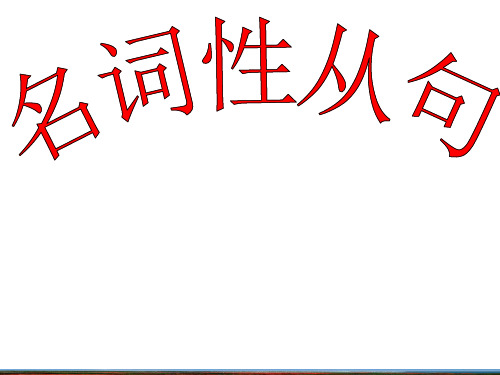2020版高考英语(新课改·人教版)一轮复习学案专题九名词性从句含解析
- 格式:doc
- 大小:136.50 KB
- 文档页数:7

名词性从句名词性从句相当于名词,可分别作主句的主语、表语、宾语和同位语。
因此,名词性从句分为主语从句、表语从句、宾语从句和同位从句。
(二)主语从句1.主语从句在复合句作主语。
e.g. Who will go is not important.2.that引导主语从句时,不能省略。
e.g. That he suddenly fell ill last week made us surprised.3.用it作形式主语,主语从句放在句末。
It+系动词+形容词+that从句. necessary,right,likely,wrong,important,certain,clear...It+系动词+名词+that从句. a pity, a shame, a fact,no wonder...It+be +动词ed+that从句. said,told,reported,suggested,considered....It+特殊动词+that从句. seem,turn out,appear,matter...e.g. It doesn’t matter so much whether you will come or not.4.whether引导的主语从句可放句首,而if引导的主语从句不能放句首,只能放句末。
Whether the worked can be completed on time is doubtful.It is doubtful whether/if the work can be completed.(三)表语从句1、表语从句在复合句中作表语,位于系动词之后。
e.g. The question was who could go there.2、引导表语从句的连接词that有时可省去。
e.g. My idea is (that) we can get more comrades to help in the work.3.一般不用if引导表语从句,用whether.The question is whether we can reduce the cost of the product.4.其他连接词:as if ,as though,because,as,like.It sounds as if/though he has been really ill.5. 主语为reason:表语从句中的连接词要用that,不用why.The reason why he was unhappy is that he has lost his keys.6.表语从句中的虚拟语气.(四)宾语从句1、宾语从句在复合句中作宾语。


考点一引导名词性从句的连接词1.连接代词who,whose,whom,what,which及wh—ever等它们有词义,在从句中作成分。
what∕whatever指物,作主语、宾语、定语、表语;who∕whoever指人,在从句中作主语、宾语;whom∕whomever指人,在从句中作宾语;whose在从句中作定语;which∕whichever指人或物,在从句中作定语、主语、宾语。
带—ever的连接词意义上有“任何……”之意。
What I want to know is the price of the bike.我想知道的就是自行车的价格。
You can buy whatever you need in the shop.在这家商店你能买到任何你需要的东西。
whoever,whatever,wherever...等引导的从句不仅是句子的语气加强了,而且此类词引导的句子表示让步和泛指的概念,而who,what,where...等引导的句子表示具体的概念。
如:What he said is right.他所说的是对的。
(特指他这次所说的事情)Whatever he said is right.无论他说什么都是对的。
此处,whatever= anything what,表示泛指和让步,意为“无论他说什么”。
Who will do it is not decideD.谁去做这件事还没有确定。
(指一次具体的动作)Whoever does it will be punisheD.无论谁做了这件事,都要受到惩罚。
(此处特别强调“无论是谁”)wh—ever这类词引导名词性从句时,不能用no matter+who∕what∕which...代替。
它们有词义,在句中作状语。
when表时间,why表原因,where表地点,how表方式、程度。
This is why I came here.这是我来这儿的原因。
I have no idea where he went.我不知道他去了哪里。



2020;2020年高考一轮复习英语(人教版)金学案语法篇名词性从句1.名词性从句试题的设问仍会坚持既注重引导词之间的语法功能差异又注重语意差异的原则,增加试题的综合化程度考查。
情景设置将越来越生动真实,但试题的难度不会大幅度提高。
2.名词性从句与强调句型和定语从句融合起来进行综合考查。
既考查了考生基本知识的掌握运用能力,又考查了考生分析句式结构、辨析从句的能力。
wh词语与whever 词语的比较考查仍是未来高考命题的热点。
一、主语从句从句在句中作主语。
它可以放在谓语之前,但习惯于用it作形式主语,而把主语从句放在后面,引导主语从句的连词有that,whether,if不能引导主语从句。
连接代词有who,what,which等,连接副词有when,where,how,why等。
二、表语从句表语从句在句中作表语,位于主句中的系动词之后。
引导表语从句的连接词有that,whether,as if;连接代词有who,what,which;连接副词where,why,when,how 等。
三、宾语从句宾语从句在句中作及物动词或介词的宾语。
引导宾语从句有连接词that,if,whether。
that可以省略。
连接代词who,whose,what,whoever,whatever,which,连接副词when,where,how,why等。
有时也常用it作形式宾语,而把宾语从句放在后面。
四、同位语从句同位语从句跟在名词后面,进一步说明该名词的具体内容。
引导同位语的名词主要有fact,news,promise,idea,truth,desire,proposal,thought,suggestion 等。
连接词有that,that在引导同位语从句中一般不能省略。
也可用连接副词how,when,where,why等。
要注意同位语从句与定语从句的区别,引导定语从句的that是关系代词,在定语从句中作主语或宾语,作宾语时可以省略。
专题九名词性从句1.that引导的名词性从句(1)that在名词性从句中不作任何成分,引导宾语从句时有时可以省略,引导主语从句、表语从句和同位语从句时不能省略。
I think that you should turn to the teacher for help.(that不充当任何句子成分,也无实际意义)我认为你应该向老师寻求帮助。
(2)that引导主语从句时,常用it作形式主语,常见句型有:①It+be+形容词(necessary/right/likely/unlikely/wrong/important/certain 等)+that从句It is wonderful that all of you have passed the difficult exam!你们都通过了这次很难的考试真令人高兴!②It+be+名词(短语)(a pity/a shame/a surprise/no wonder等)+that从句It is a pity that you have missed the wonderful lecture.你错过了这么精彩的演讲真遗憾。
③It+be+过去分词(said/told/reported/decided等)+that从句It is suggested that the lab building (should) be built next year.有人建议实验楼明年修建。
④It+特殊动词(seems/appears/happens/matters)+that从句It appears that they have made the same mistake.好像他们犯了同样的错误。
[名师指津]在以下主语从句中,常使用虚拟语气,即“should+动词原形”形式,其中的should可以省略。
①It is necessary/strange/important/natural etc.+that ...②It is a pity that ...③It is suggested/requested/required/proposed/desired etc. +that ...(3)动词find, feel, think, consider, make, believe等后面有宾语补足语时,需用it作形式宾语而将that引导的宾语从句后置。
I think it necessary that we take plenty of boiled water every day.我认为我们每天喝大量的开水是很有必要的。
2.whether与if 引导的名词性从句(1)whether引导的主语从句既可放在句首也可放在句末,但if引导的主语从句只能放在句末,且前面需用it作形式主语。
Whether it is true remains a question.这是否是真的依然是个问题。
It is unknown if he will attend the meeting.他是否会来参加会议还不清楚。
(2)whether与if引导宾语从句时,大多数情况下可以互换,后面直接跟or not时用whether,用于介词后引导宾语从句时也用whether。
We don't know whether or not she was ready.我们不知道她是否准备好了。
I'm interested in whether you've finished the work.我对你是否完成了这项工作感兴趣。
(3)whether可引导表语从句和同位语从句,而if则不可以。
The question is whether it is worth doing.问题是它是否值得做。
The question whether the work was worth doing has not been decided.这项工作是否值得做的问题还没有确定。
1.连接代词who, whom, whose, what, which等不但起连接作用,也在从句中作名词或代词所作的成分,如主语、表语、宾语、定语等。
缺少连接代词,从句不完整。
What worries us most is who let out the secret.最令我们担忧的是谁泄漏了秘密。
2.连接副词引导的名词性从句连接副词when, where, why, how等不但起连接作用,也在从句中作状语,表示时间、地点、原因和方式等。
He didn't tell me when we would meet again.他没告诉我什么时候我们再见面。
Go and get your coat. It's where you left it.去把你的大衣拿来。
就在你原来放的地方。
I have no idea how I can express myself clearly in English.我不知道如何用英语清楚地表达自己。
That's why I want you to work there.那就是我要你在那儿工作的原因。
3.“疑问词+-ever”引导的名词性从句“疑问词+-ever”引导名词性从句时,有词意,并且在从句中充当一定的句子成分。
Whoever breaks the law should be punished.无论谁触犯法律都应该受到惩罚。
Wherever children go makes their parents worry.孩子们无论去哪儿父母都担心。
[名师指津]“疑问词+-ever”还可以引导让步状语从句,但“no matter+疑问词”只能引导让步状语从句,不能用来引导名词性从句。
Whatever (=No matter what) you do, you must do it well.无论你做什么,都必须做好。
[命题点感悟]单句语法填空①(2018·浙江11月高考)It is possible ________ caffeine may cause birth defects (缺陷) in humans, too.解析:that it作形式主语,that从句为真正主语。
②(2017·天津高考改编)She asked me________ I had returned the books to the library, and I admitted that I hadn't.解析:whether/if句意:她问我是否已经把书还给图书馆了,我承认说我还没有还。
分析句子结构可知,空格处引导宾语从句,且在从句中不作任何成分,只起连接作用;又根据句意可知此处表示“是否”,故用whether或if引导宾语从句。
③(2016·全国卷Ⅰ)My uncle is the owner of a restaurant close to ________ I live.解析:where分析句子结构可知,介词to之后为宾语从句,宾语从句中缺少地点状语,故用where引导。
④(2015·全国卷Ⅱ)As natural architects, the Pueblo Indians figured out exactly ________ thick the adobe walls needed to be to make the cycle work on most days.解析:how分析句子结构可知,空格处是一个宾语从句。
空格后的thick为形容词,因此空格处应用副词,故填how。
⑤(2014·广东高考)I didn't understand ________ this would happen and my credit card had already been charged for the reservation.解析:why根据语境可知,“我”不知道/不明白为什么会发生这样的事情。
不明白的一定是原因,故用why引导。
1.that和what的区别that引导名词性从句时,在主从句中不充当任何句子成分,也没有任何含义;而what 引导名词性从句时,在主从句中都要充当一定的句子成分,what可以分解成定语从句中的“先行词+关系代词”,即常说的“先行词+that/which/who”。
It's a shame that he has made such a mistake.真遗憾,他犯了这样一个错误。
I will do what I can (do) to help him.我将尽我所能帮助他。
2.同位语从句与定语从句的区别判断是定语从句还是同位语从句可以用“加词”的方法,即在名词和从句之间加入一个be动词,如果句子意思成立,则是同位语从句,否则,则是定语从句。
试比较:①The notice that the meeting had to be put off was true.(同位语从句)→The notice was that the meeting had to be put off.②The notice that he read just now was true.(定语从句)[专题过关训练]Ⅰ.单句语法填空1.And it evaluates how well you combine your listening, reading, speaking and writing skills to perform academic tasks.2.Now, he is still waiting to find out whether/if he has broken the record.3.He promised to give a great reward to whoever_ found the watch.4.“That's exactly what_ I need,”Mr. Vincent said to himself.5.Think about what you want in the coming year, then ask yourself why you want that.6.Another possible reason is that on average, the British people don't take themselves too seriously.7.What he did know was that he was very thankful for the opportunity given to him.8.The two presidents talked by telephone on Friday, but the details of what they said were not available.9.Reading exposes you to new words, and you will see how those words are used.10.The third reason is that some students have to get up early on weekdays to get to school far away from home.11.Some students prefer to choose a major first so they can learn what they are interested in.12.If we are in the habit of raising doubts as to whether what we are told is true, we can find the correct answer and learn more.13.I'd like to know how the activity is scheduled in detail.14.With such a pen pal, I hope I can share with her my experiences in traveling, taking care of pets, or whatever we have in common.15.(2019·云南昆明一中模拟)What made Mr. Green surprised was that it was just his daughter, who wore a suit of man's clothes.Ⅱ.运用语法写靓句1.许多学生的成功是因为他们为考试做了充分的准备。